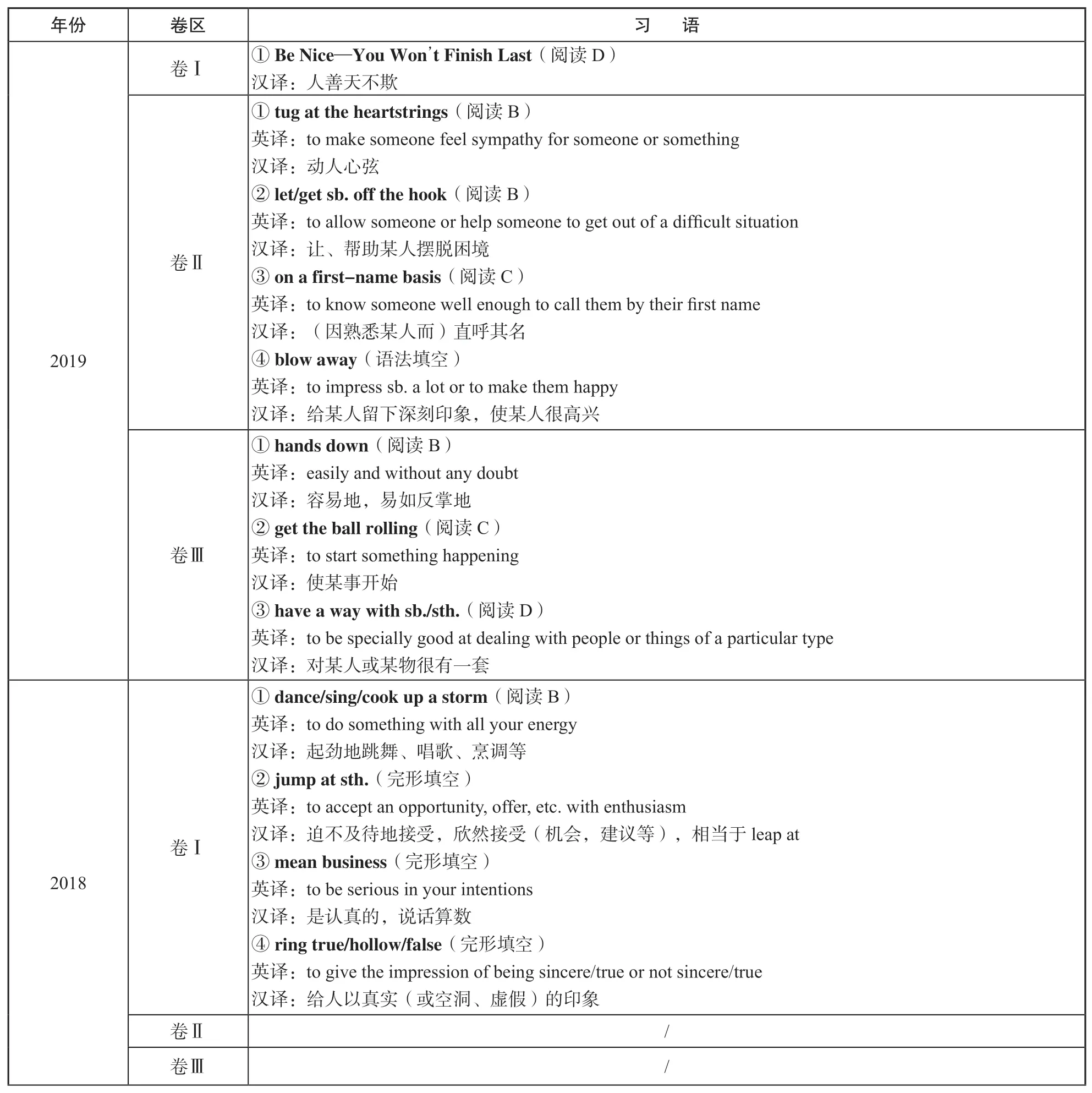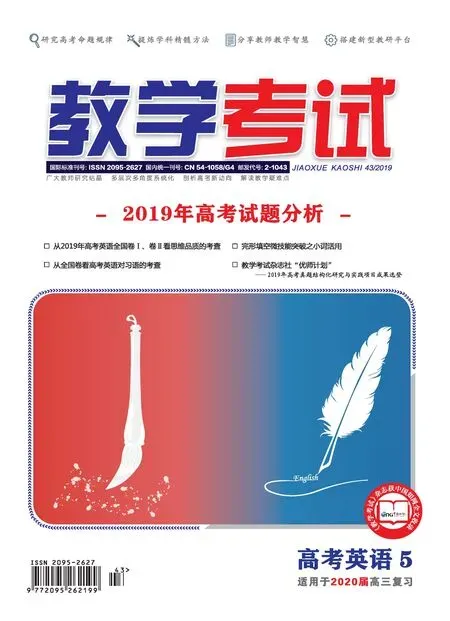从全国卷看高考英语对习语的考查
辽宁 赵慧玲
习语既是文化的载体,又是语言的精华,在写作中恰当地运用习语能够使文章更加地道。在2019 年高考英语三套全国卷中,习语的运用明显增多,这体现了高考逐渐重视对学生英语学科核心素养的考查,也提醒教师要指导学生回归英语阅读的“本味”,摆脱中式思维。笔者对近三年高考英语全国卷中习语的运用进行了汇总,具体如下:


续表
通过上面的表格,我们可以发现高考英语全国卷中习语的数量呈逐年增加的趋势,这彰显出当今时代发展对人才的选拔提出了更高的要求:不仅要考查英语学科知识与技能,还要在检测学生的语言意识和语感中考查英语学科核心素养,做到优中选优。因此,本文结合高考考情,就习语出现的位置及作用进行分类整理,并结合典型实例给出教学建议。
一、出现在语篇中
(一)与设题相关
阅读理解与完形填空之所以成为高考英语试卷中习语运用的高频区,是因为这两种题型的文章较完整连贯,便于将英语语言文化与学科知识、能力相融合,进一步考查学生英语学科核心素养。考生需对习语做出准确判断后,方能得出正确答案。
【例1】(2017 年全国卷Ⅱ,阅读D)Some plants pump out smelly chemicals to keep insects away.But others do double duty.They pump out perfumes designed to attract different insects who are natural enemies to the attackers.Once they arrive,the tables are turned.The attacker who was lunching now becomes lunch.
33.What does the author mean by“the tables are turned”in Paragraph 3?
A.The attackers get attacked.
B.The insects gather under the table.
C.The plants get ready to fight back.
D.The perfumes attract natural enemies.
【解题思路】本题为词义猜测题,考查考生根据语境推断习语意义的能力。画线短句由习语“turn the tables(on sb.)”转化而来,意为“转弱为强”。同时,根据下文“The attacker who was lunching now becomes lunch.”(意为“正在吃午餐的攻击者现在成为了别人的午餐。”)可以推出正确答案为C。错误选项B 通过以词解词,误导没有读懂习语的考生。
【例2】(2019 年全国卷Ⅱ,阅读B)I guess that there’s probably some demanding work schedule,or social anxiety around stepping up to help for an unknown sport.She may just need a little persuading.So I try again and tug at the heartstrings.I mention the single parent with four kids running the show and I talk about the dad coaching a team that his kids aren’t even on...At this point the unwilling parent speaks up,“Alright.Yes,I’ll do it.”
25.What does the underlined phrase“tug at the heartstrings”in Paragraph 2 mean?
A.Encourage teamwork.
B.Appeal to feelings.
C.Promote good deeds.
D.Provide advice.
【解题思路】2019 年全国卷Ⅱ同样以词义猜测题的形式考查考生根据语境推测陌生习语意义的能力。正确选项依旧是根据下文“I mention the single parent with four kids running the show and I talk about the dad coaching a team that his kids aren’t even on...”推出。但不同之处在于错误选项不再以词解词,而是通过未透彻理解文章主题衍生出错误推理。该题不仅考查了考生根据语境推测陌生习语意义的能力,更检测了其对主旨的提取和掌握情况。
【例3】(2018 年全国卷Ⅰ,阅读B)Good Morning Britain’s Susanna Reid is used to grilling guests on the sofa every morning,but she is cooking up a storm in her latest role—showing families how to prepare delicious and nutritious meals on a tight budget.
24.What do we know about Susanna Reid?
A.She enjoys embarrassing her guests.
B.She has started a new programme.
C.She dislikes working early in the morning.
D.She has had a tight budget for her family.
【例4】(2019 年全国卷Ⅱ,阅读C)Just two seats over,Andrew Mazoleny,a local videographer,is finishing his lunch at the bar.He likes that he can sit and check his phone in peace or chat up the barkeeper with whom he’s on a firstname basis if he wants to have a little interaction(交流).“I reflect on how my day’s gone and think about the rest of the week,”he said.“It’s a chance for self-reflection.You return to work recharged and with a plan.”
30.What do we know about Mazoleny?
A.He makes videos for the bar.
B.He’s fond of the food at the bar.
C.He interviews customers at the bar.
D.He’s familiar with the barkeeper.
选取2016年1月至2016年12月于本院实施消化内镜微创治疗的110例患者作为研究对象,按照数字随机法将患者分成两组,一组采用表面麻醉,为常规组,一组采用静脉麻醉,为实验组,每组55例患者。常规组患者年龄25~82岁,平均年龄(54.8±1.2)岁,其中有男性25例,女性30例;实验组患者年龄24~80岁,平均年龄(54.5±1.4)岁,其中有男性26例,女性29例。所有患者及其家属均同意参与本次研究,排除感觉功能异常的患者;排除存在语言功能障碍的患者;排除麻醉过敏患者,本实验获得了本院伦理委员会的批准,两组患者一般资料比较不存在统计学意义(P>0.05),可以进行比较。
【解题思路】2019 年全国卷Ⅱ第30 题延续了2018 年全国卷Ⅰ第24 题的命题思路,依旧考查考生作出判断和推理的能力,要求考生理解习语的含义。根据“He likes that he can sit and check his phone in peace or chat up the barkeeper with whom he’s on a first-name basis if he wants to have a little interaction(交流).”可知,Mazoleny 如果想有一点交流互动,他可以很熟络地和酒吧服务员聊天。故正确答案为D。不同的是原文中没有辅助信息帮助考生理解习语的含义,加大了习语考查的难度,更加凸显对考生英语学科核心素养的考查。
(二)与设题无关
习语出现在语篇中,使文章言简意赅,语言生动活泼。这样的选材有助于考生了解英美文化背景,提升其跨文化交际能力。
【例5】(2018 年全国卷Ⅰ,完形填空)
...I jumped at the idea of taking the class because,after all,who doesn’t want to save a few dollars?...
Maurice Ashley was kind and smart,a former graduate returning to teach,and this 48 was no game for him;he meant business....
...“The absolute most important 56 that you learn when you play chess is how to make good 57 .On every single move you have to 58 a situation,process what your opponent(对手)is doing and 59 the best move from among all your options.”These words still ring true today in my 60 as a journalist.
【作用解读】2018 年全国卷Ⅰ完形填空运用了三处习语:“jump at sth.”意为“迫不及待地接受,欣然接受(机会、建议等)”;“meant business”意为“是认真的”;“ring true”意为“给人以真实的印象”。第二处与第三处不涉及试题,第二处用来解释前文内容,第三处用来升华主旨。试题选材地道,体现出高考英语对语言实际运用的重视,进一步考查考生的语言能力和综合素养。
【例6】(2019 年全国卷Ⅱ,语法填空)She said,“We don’t have any idea who put grandma forward.When we got a call 68(say)she was short-listed,we thought it was 69 joke.But then we got an official letter and we were blown away.We are so proud of her.It’s 70(wonder).”
【作用解读】2019年全国卷Ⅱ效仿了2018年全国卷Ⅰ,不仅在阅读中多处运用习语表达,更在语法填空中加入了一处习语“blown away”,意为“使某人很高兴”。本句意为“祖母入选的消息使我们很高兴”。语言地道规范,在考查考生语言能力的同时,也考查了考生的英语学科核心素养。
【例7】(2019 年全国卷Ⅲ,阅读C)This new trend of newspapers for“the man on the street”did not begin well.Some of the early ventures(企业)were immediate failures.Publishers already in business,people who were owners of successful papers,had little desire to change the tradition.It took a few youthful and daring businessmen to get the ball rolling.
(2019 年全国卷Ⅲ,阅读D)Monkeys seem to have a way with numbers.
A team of researchers trained three Rhesus monkeys to associate 26 clearly different symbols consisting of numbers and selective letters with 0-25 drops of water or juice as a reward.The researchers then tested how the monkeys combined—or added—the symbols to get the reward.
【作用解读】2019 年全国卷Ⅲ与全国卷Ⅰ、卷Ⅱ一脉相承,在阅读C 的结尾及阅读D 的开头分别运用了习语。“get the ball rolling”意为“使某事开始”;“have a way with”意为“对某人、某物很有一套”。以习语结尾,使文章耐人回味;以习语开头,抓住考生的眼球。均以地道的选材考查考生的英语学科核心素养。
二、出现在选项中
习语朗朗上口,约定俗成,具有浓厚的修辞色彩。在选项中运用习语能让答案尽显文化韵味。
【例8】(2019 年全国卷Ⅰ,阅读D)
35.What is the best title for the text?
A.Be Nice—You Won’t Finish Last
B.The Higher the Status,the Better
C.Be the Best—You Can Make It
D.More Self-Control,Less Aggressiveness
【解题思路】本题为标题概括题,考查考生理解主旨要义的能力。选项A“Be Nice-You Won’t Finish Last”是英文谚语“Nice guys finish last(人善被人欺)”的变化形式,意为“人善天不欺”。本文讲述了青少年在小学与中学阶段的受欢迎类型及其影响。并从影响中总结出一个道理——人善天不欺。此题沿用了2017 年全国卷Ⅱ第33 题的特点,均是习语的变化形式,不同的是考点发生了变化,由词义猜测题变为标题概括题。该题在考查学科知识、能力的同时注重对语言文化的考查,不失为一道经典考题。
【例9】(2019 年全国卷Ⅱ,阅读D)
35.What is the best title for the text?
A.NASA:The Home of Astronauts
B.Space:The Final Homework Frontier
C.Nature:An Outdoor Classroom
D.HUNCH:A College Admission Reform
【习语解说】有趣的是,同一题型,同一位置,2019 年全国卷Ⅱ与全国卷Ⅰ的命题形式如出一辙。同样为标题概括题,正确答案同样是习语的变化形式。《朗文词典》对“space:the final frontier”的解释为“太空,最后的边疆”。“the final frontier”就是太空的别称。本文主要介绍了美国一所中学与NASA 的联合科研项目,鼓励学生开发创新思维,培养实际生活技能。因此,为融入文中的主人公——高中生这一元素,标题中加入了“homework”一词,把该项目的任务生动地比喻为“homework”。标题译为“太空,期末作业最前沿”或者“太空,最前沿的期末作业”。
三、教学启示
通过以上分析,我们可以粗略地认识并掌握高考英语试题中习语运用的规律:当习语出现在语篇中且与试题相关时,常考查词义猜测题;当习语出现在试题的选项中时,多考查标题概括题;当习语只是出现在语篇中不涉及试题的解答时,则凸显语言的原汁原味。而面对高考英语全国卷中习语的数量逐年增加的现象,教师在教学过程中应做到以下几点:
1.注重习语的积累
教师应注重指导学生积累习语。而学生知识储备及接受能力的差异则要求教师采取更加灵活的教学方式,如:
(1)运用教材内容,帮助学生正确积累习语
高中英语教材中往往穿插着丰富的习语和原汁原味的英文表达。例如外研版教材EVERYDAY ENGLISH 板块即是对READING AND VOCABULARY 板块中习语或固定表达部分的提炼和整理。因此,教师要重视对这一板块的教学,带领学生接触习语,并在学习过程中及时纠正学生从字面上理解习语的错误的思维方式,环环相扣、层层深入,最终达到使学生既拥有丰厚的习语储备,又能掌握习语解读规律的教学目标。
(2)设计教学活动,引导学生主动积累习语
对于水平较高且自主学习能力较强的学生,教师应有计划、有针对性地设计习语积累的教学活动,例如习语小讲堂——教师根据教学实际,结合学生的特点,精心设计课前三分钟活动,让学生利用课前三分钟自主介绍一则习语,每周坚持进行2~3 次,并灵活安排课后练习或检测,验收学习成果。教师在活动过程前后应做好引导者和把关者,把学习的主动权交给学生,并在必要时进行指导。做到将习语学习与调动学生积极性紧密结合,充分发挥习语对于提升学生英语运用能力的积极作用,进而提高学生的综合素养。
2.注重阅读理解板块两种能力的培养
(1)词义猜测题——重在培养学生根据上下文推断单词和短语含义的能力
从近三年高考英语全国卷中不难看出,要想攻克词义猜测题,教师要着重培养学生依据语境体会被猜测词或短语的语境意义。这往往离不开词汇的积累、对长难句的理解以及对地道语言的接触和感悟。同时,教师还要让学生了解一些错误选项设置的常见规律,比如以词解词、扭曲原文信息等。
(2)标题概括题——重在培养学生理解主旨要义的能力
标题概括题对很多考生来说是个挑战,考生常常失分。从近三年高考英语全国卷中可以看出,此类题不仅考查考生理解文章主旨要义的能力,有时还要求考生准确感悟地道的语言。这就要求教师不仅要培养学生理解文章主旨要义的能力,还要帮助学生积累习语,提升学生对习语的感悟能力。此外,教师应帮助学生了解错误选项设置的常见规律,如用部分代替整体、标题过大过空等。

